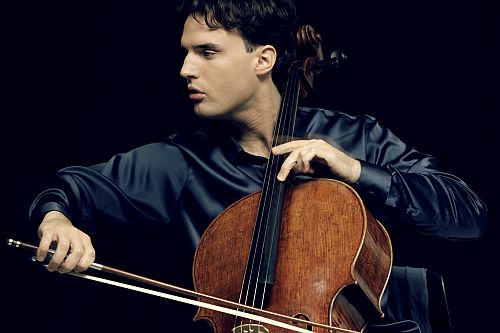 United Kingdom Lyadov, Prokofiev & Vaughan Williams: Leonard Elschenbroich (cello), BBC Philharmonic Orchestra/Vassily Sinaisky (conductor), Bridgewater Hall, Manchester, 21.3.2015 (MC)
United Kingdom Lyadov, Prokofiev & Vaughan Williams: Leonard Elschenbroich (cello), BBC Philharmonic Orchestra/Vassily Sinaisky (conductor), Bridgewater Hall, Manchester, 21.3.2015 (MC)
Lyadov: Eight Russian Folk Songs
Prokofiev: Symphony-Concerto for cello and orchestra
Vaughan Williams: Job, A Masque for Dancing

When I first saw the new season programme Prokofiev and Vaughan Williams seemed unlikely bedfellows and after attending the concert my view was reinforced. Each work was played superbly yet the individual twentieth-century sound worlds of Prokofiev and Vaughan Williams seemed to jar a little. If anything the Lyadov pieces complemented the English composer rather than his Russian compatriot.
First on the programme was Anatoly Lyadov the master of the Russian miniature form who was represented by hisEight Russian Folk Songs’. These songs that Lyadov had orchestrated are a collection of toothsome morsels that I hadn’t heard before and neither had anyone else I spoke too. Each with a descriptive title such as Christmas Carol ’Kolyada’, Plaintive Song and Round Dance these simple character pieces were a real find, charmingly easy on the ear and so beautifully played by the BBC Philharmonic.
After Lyadov’s fairy-tale simplicity came the thornier sound world of Prokofiev. A pulsating and driving work the ‘Symphony-Concerto’ for cello and orchestra, despite a handful of recordings, is frequently overlooked in the concert hall and doesn’t reveal its treasures easily. Prokofiev didn’t make his score straightforward for soloists and Leonard Elschenbroich with intense concentration certainly had to labour hard to keep the work’s cogency through the shifting mood changes and the testing rhythms and dynamics. The mellow and velvety timbre from Elschenbroich’s cello, a Matteo Goffriller (Venice, 1693) known as the ‘Leonard Rose’, was matched by the instrument’s highly polished wood. Throughout his performance Elschenbroich was being watched by his partner, star violinist Nicola Benedetti, who was in the audience. I smiled at the ridiculous thought of her walking onto the stage after the interval to give an impromptu rendition of ‘The Lark Ascending’. For those who wish to hear more of Elschenbroich’s playing I can alert them to his superb recent recording of the Kabalevsky Second Cello Concerto on the Onyx label. http://www.musicweb-international.com/classrev/2015/Mar/Prokofiev_cello_4122.htm
With the spiky dissonant effects of the Prokofiev gradually fading from the consciousness, after the interval it was good to have the opportunity of hearing Vaughan Williams’ Job, A Masque for Dancing. Job is more accurately a ballet set to Geoffrey Keynes’s scenario based on eight William Blake engravings of the Biblical story. Sadly in recent decades Job has suffered from changes in vogue and is known more by reputation rather than actual concert performances. As I have come to expect the control of Maestro Sinaisky, Conductor Emeritus of the BBC Philharmonic, was commanding, directing an expertly paced reading, so wonderfully expressive and incisively managing the wide dynamics. An extremely testing work to perform, all the orchestral sections excelled in this Old Testament journey. I relished the vibrant woodwind and the boldly effective brass with the exceptional strings mustering a richly expressive sonority of a standard so usually bracketed with the finest Austro/German orchestras. In all my excitement I almost forgot to praise the extended violin solo required of leader Yuri Torchinsky.
The concert was being broadcast live by BBC Radio 3
Michael Cookson